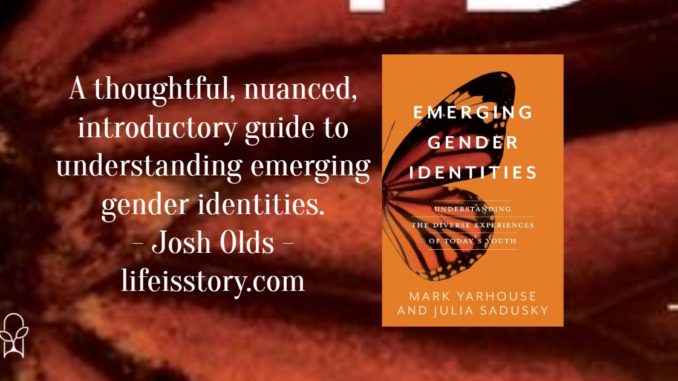
Published by Brazos Press Genres: Non-Fiction, Christian Life
Buy on Amazon
Goodreads

This book offers a measured Christian response to the diverse gender identities that are being embraced by an increasing number of adolescents. Mark Yarhouse and Julia Sadusky offer an honest, scientifically informed, compassionate, and nuanced treatment for all readers who care about or work with gender-diverse youth: pastors, church leaders, parents, family members, youth workers, and counselors.
Yarhouse and Sadusky help readers distinguish between current mental health concerns, such as gender dysphoria, and the emerging gender identities that some young people turn to for a sense of identity and community. Based on the authors' significant clinical and ministry experience, this book casts a vision for practically engaging and ministering to teens navigating diverse gender-identity concerns. It also equips readers to critically engage gender theory based on a Christian view of sex and gender.
Gender identity has become one of the most contentious social issues in contemporary culture. Unfortunately, the conversation that tends to exist about the issue is always in the realm of hyperbolic extreme. They’re conversations that generate a lot of heat, but not much light. Emerging Gender Identities is a thoughtful, nuanced, introductory guide to understanding various gender identities. The book especially speaks to parents who may be navigating the tricky waters of gender identity with their children.
The two authors are Mark Yarhouse and Julia Sadusky. Yarhouse has been in the field and has more experience than any other Christian psychologist in the realm of sexual and gender identity. He serves as the head of the Sexual and Gender Identity Institute. Sadusky is a clinical psychologist and a youth and ministry educator whose professional researching focuses on sexual and gender identity. She serves as an advisor for the Center for Faith, Sexuality and Gender. In other words, Yarhouse and Sadusky have the credentials: they are traditionally conservative Christians with an extensive professional experience in sexual and gender identity issues. They are a professional, competent voice that can speak with clinical precision, scientific accuracy, and biblical foundations. Yarhouse in particular stands out as the best example of compassionate, academic conservative evangelical thinking on the issue.
Emerging Gender Identities represents, in a way, a progression of thought for Yarhouse since his 2015 book Understanding Gender Dysphoria. In that book, Yarhouse seemed to imply that emerging gender identities stemmed from gender dysphoria. This book clarifies that emerging gender identities are separate from dysphoria, which is an important perspective change, moving the conversation from mental illness to sociological norms.
The first part of Emerging Gender Identities defines terms, provides case studies, explores the histories, and explains the controversies. Yarhouse and Sadusky do an excellent job of being academically precise while remaining accessible to laypeople. Many of the arguments that are had on issues of gender identity would be resolved if only people understood what was being argued. In particular, they are able to explain why these issues are only now emerging rather than having been understood earlier in history. While some would cry “liberal indoctrination,” they suggest that changes in culture and language are simply giving people the words and the safety to talk about how some segments of the population have always felt.
The second part of the book moves from the issue to the person. This movement is critical, because it treats transgender, nonbinary, genderfluid, agender, and any other individual in the spectrum as people first rather than focusing on how they are different from majority culture expectations. Yarhouse reiterates his “three lens” theory of perspectives on gender identity: the disability/difference lens, the diversity lens, and the integrity/sacred lens. The first lens views nontraditional gender identities as sin or as a mental illness. The second lens sees these identities as part of a natural diversity. Yarhouse advocates for the integrity/sacred lens, which acknowledges differentiation and diversity, but also emphasizes “creational intent.”
From this, Emerging Gender Identities walks readers through how to best relate to individuals experiencing emerging gender identities. They go well beyond the traditional conservative response of “sex equals gender and get over it,” but not so far as the “anything goes” attitude of the liberal perspective. While not everybody will be happy with the balanced position that Emerging Gender Identities settles on, it remains an important work for evangelical Christians coming from non-affirming backgrounds, showing them how to affirm the humanity and the God-imagedness of all people regardless of gender identity. To put it most crassly, it’ll probably not move people toward being more conservative, but it should hopefully move people toward being more liberal. As Yarhouse and Sadusky’s audience is primarily Christian conservatives, that’s precisely the effect it should have. They move the issue from “culture war” to “love your neighbor.”
While I wish that Emerging Gender Identities would go just a bit further in pushing evangelicals toward acceptance, I’m satisfied with where Yarhouse and Sadusky end up. They acknowledge the issue is complex and multi-faceted, that individuals might experience atypical gender identities for any number of legitimate reasons, and encourages the church to understand others with nuance and care—because there’s assuredly someone in your life who may identify in this way.
